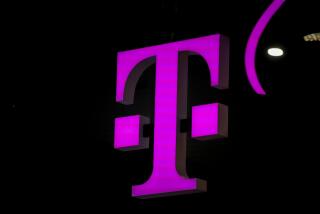THE PLAYERS : This Marriage Is Only the Biggest Deal So Far in a Realigning Industry
- Share via
SBC Communications Corp.’s announcement Monday of its plans to acquire Pacific Telesis Group is just the largest in a series of mergers and realignments that are dramatically changing the competitive landscape of the nation’s telecommunications industry.
“Everyone is positioning themselves to be the new model of an integrated, one-stop service provider,” said Bryan Van Dussen, director of telecommunications research at Yankee Group, a Boston-based market research company. “In the long run you’re going to see three or four companies the size of AT&T.;”
The immediate trigger for the merger is the recent telecommunications bill, which opened the way for long-distance, local telephone, cable and wireless companies to move into one another’s markets.
“What everybody is trying to do is to build as many access points as possible to the customer, whether it’s through wireless, cable TV or telephone, and then offer a variety of services,” Van Dussen said.
The company to beat is AT&T; Corp., with its 80 million customers and its rock-solid brand name. AT&T; got an early jump on the competition with its acquisition two years ago of McCaw Cellular and its national wireless communications networks.
*
In recent months, AT&T; has announced plans to offer Internet services to customers nationwide and taken a minority stake in DirecTv, Hughes Communications’ red-hot satellite television upstart. AT&T; has also applied in all 50 states to offer local phone service.
The merger of SBC and Pacific Telesis, analysts said, is in large part a defensive play in the face of such power.
“The merger is a de facto acknowledgment that PacTel and SBC can’t compete,” said Christopher Dixon, a media analyst at PaineWebber Inc.
SBC and PacTel hope to offset the loss of customers to new competition in local phone service by selling more profitable services such as long-distance, wireless, voice mail, paging and Internet access to their shrinking customer base.
“This merger sets the guidelines for future mergers,” says Elaine Altman, a telecommunications analyst at Furman Selz in New York. “The games have just begun.”
*
Analysts predict the next merger will be that of Philadelphia-based Bell Atlantic Corp. and Nynex Corp. of New York. The two companies have already combined their cellular phone business and are in talks to work together to offer long-distance services in their respective markets.
“Right now you’re splitting the Washington, D.C.-to-Boston corridor, which has tremendous commonality,” says Bell Atlantic spokesman Jay Grossman. The only thing holding the two companies back, analysts say, is antitrust questions likely to be raised by the creation of a single behemoth in the Eastern corridor.
Colorado-based US West, which has few major cities in its own region, has taken a different tack to boost its customer base. The company has a large investment in Time Warner Inc. and announced in February that it would pay $10.8 billion to acquire Continental Cablevision Inc.
But US West may be alone in that strategy. Monday’s merger announcement depressed cable stocks because it suggested that Bell companies are more likely to merge with each other than buy cable companies.
The cable companies are crafting strategies of their own. For years, cable companies have been amassing subscribers in geographic clusters in preparation for competition with phone companies. But the infrastructure to deliver phone service over cable lines will take years to put in place.
Still unclear are the strategies for the No. 2 and No. 3 long-distance providers--MCI Communications Corp. and Sprint Corp. MCI’s equity position in Rupert Murdoch’s News Corp. gives it a stake in satellite services, and it has joined with Microsoft Corp. to offer Internet services. MCI has also announced plans to spend as much as $2 billion to build networks in major metropolitan areas to offer local phone service. But there are parts of the strategy, including how MCI will offer wireless services, that are still unclear.
Sprint has a joint venture with cable companies to offer telephony and wireless service over cable networks. The company has already begun offering digital cellular service in Washington, and has plans to move to California later this year as part of a national roll-out. But there have been some strains to the partnership, and it is unclear whether it will survive.
Chicago-based Ameritech Corp. and Atlanta-based BellSouth Corp. insist they will stick to their local markets where their brand names are strong and where they believe they have the biggest opportunities for growth.
“Bigger isn’t necessarily better,” said Dave Onak, a spokesman for Ameritech. “We have plenty of opportunities inside our own region.”
But then, that is what Pacific Telesis had been saying until Monday’s announcement.
More to Read
Inside the business of entertainment
The Wide Shot brings you news, analysis and insights on everything from streaming wars to production — and what it all means for the future.
You may occasionally receive promotional content from the Los Angeles Times.










